This article was co-authored by Joshua Ellenhorn, MD and by wikiHow staff writer, Janice Tieperman. Joshua Ellenhorn, MD, is a board certified surgeon with advanced training in the fields of surgical oncology, minimally invasive surgery, and robotic surgery. He runs a private practice at Cedars-Sinai Medical Center in Los Angeles, California and is a nationally recognized leader in surgery, cancer research, and surgical education. Dr. Ellenhorn has trained more than 60 surgical oncologists and has spent over 18 years in practice at the City of Hope National Medical Center, where he was a professor and the chief of the Division of General and Oncologic Surgery. Dr. Ellenhorn performs the following surgical procedures: gallbladder surgery, hernia repair, colorectal cancer, skin cancer and melanoma, gastric cancer, and pancreatic cancer. He earned an MD from the Boston University School of Medicine, completed fellowships at the University of Chicago and Memorial Sloan-Kettering Cancer Center and finished his residency in surgery at the University of Cincinnati.
There are 19 references cited in this article, which can be found at the bottom of the page.
wikiHow marks an article as reader-approved once it receives enough positive feedback. This article received 41 testimonials and 100% of readers who voted found it helpful, earning it our reader-approved status.
This article has been viewed 2,129,467 times.
Gallbladder pain, which occurs in the right upper part of the abdomen, can be mild to severe. While gallstones are a common cause, you should see your doctor to rule out other issues. For mild pain, over-the-counter pain medication can offer the most immediate relief. In the long term, dietary changes can lower your risk for gallstone flare-ups. For severe pain or for pain accompanied by fever or jaundice, seek immediate medical attention.
Things You Should Know
- Take acetaminophen for quick pain relief. Talk to your doctor before taking an NSAID like ibuprofen or aspirin, since they can be hard on your stomach.
- Soothe the pain with a warm compress or bath. A castor oil compress can also help ease your gallbladder pain.
- Prevent future gallbladder pain by drinking lots of water and eating plenty of high-fiber and vitamin C-rich foods.
- See a doctor if you have severe and/or persistent gallbladder pain that refuses to go away.
Steps
Getting Fast Pain Relief
-
1Take an over-the-counter pain reliever as directed. An over-the-counter pain reliever, such as acetaminophen, is usually the best, most immediate way to control pain. Acetaminophen can cause liver damage, so make sure your pain isn’t related to your liver before taking it.[1]
- You should only take an NSAID, such as aspirin or ibuprofen, in consultation with your doctor. These medications can upset your stomach, which could end up worsening your gallbladder pain.
- If over-the-counter medications aren’t effective, your doctor might prescribe an antispasmodic drug, which relaxes the gallbladder.[2]
- Take any medication as directed by your doctor or according to the label’s instructions.
-
2Apply a warm compress to the affected area. For immediate relief, wrap a hot water bottle, heating pad, or store-bought warm compress in a cloth. Apply it to your upper right abdomen, and keep it in place for 20 to 30 minutes.[3]
- Stand up and try to walk around after using the warm compress. Apply it every 2 to 3 hours during a flare-up.
Advertisement -
3Try applying a castor oil warm compress. To make a castor oil compress, soak a clean cloth in pure castor oil, apply it to the affected area, then cover it with plastic wrap. Hold the warm compress over the plastic for 30 minutes to relieve pain and inflammation.[4]
- Use a warm castor oil application once a day for 3 days.
-
4
-
5Make a turmeric tea. You could slice a 2 in (5.1 cm) piece of turmeric root, and boil the slices in a pot of water to make a tea. Alternatively, you could take a 1000 to 2500 mg turmeric tablet daily. Among other medical conditions, turmeric is used to relieve gallbladder issues.[7]
- While it’s generally safe, you should still consult your doctor before trying turmeric tea or a turmeric supplement in tablet form.
- Turmeric and other herbs may rapidly empty the gallbladder. While this increased bile flow might help relieve pain, it could lead to a bile duct blockage or other complications. Check with your doctor to stay on the safe side.[8]
-
6Sip some water to help soothe your abdominal pain. Pour yourself a glass of water (or another type of clear fluid). Continue sipping your drink—not only will it help you stay hydrated, but it may also help ease some of the pain you're experiencing.[9]
- Sports drinks also work for this, as long as you're only drinking a little bit at a time.
-
7Relieve related digestive issues with betaine hydrochloride. While supplemental hydrochloride doesn’t directly affect the gallbladder, it can help improve digestion and relieve related symptoms such as bloating, belching, and nausea. A standard dose is at least 600 mg of betaine hydrochloride with every meal.[10]
- You can find over-the-counter betaine hydrochloride online or at your local pharmacy.
- Ask your doctor if supplemental hydrochloride is right for you. Don’t take it if you have a history of heartburn, acid reflux, gastritis, or stomach ulcers. Stop using it if you feel a burning sensation in your stomach.[11]
Preventing Pain with Dietary Changes
-
1Drink at least 8 cups (1.9 L) of water per day. Water is great for your overall health, and can help your body break down the substances that form gallstones. If you’re experiencing diarrhea related to gallbladder issues, it’s especially important to stay hydrated.[12]
- While 8 cups (1.9 L) is a general guideline, you’ll need to drink more in hot weather or during exercise. If you’re sweating a lot or working outdoors in the heat, try to drink 16 to 32 fl oz (470 to 950 mL) per hour.
-
2Eat more high-fiber foods, such as fruits, veggies, and whole grains. Fiber helps lower the cholesterol content in bile, which can prevent gallstones from forming. Good sources of fiber include raw fruits and veggies (especially leafy greens), lentils, brown rice, and whole grain pastas, breads, and cereals.[13]
- If you’ve recently had gallbladder surgery or are on a special diet, check with your doctor about how much fiber is safe to consume.[14]
-
3Increase your intake of citrus and other sources of vitamin C. Vitamin C might make cholesterol easier for your body to dissolve, which can prevent gallstone flare-ups. Go for at least 75 to 90 mg of vitamin C per day. This is the approximate amount contained in a glass of orange juice or a medium-sized orange, so meeting your daily requirement is easy.[15]
- Sources of vitamin C include other citrus fruits, such as grapefruit, as well as kiwi, strawberries, and red and green bell peppers.
- You could also ask your doctor about taking a daily vitamin C supplement. Keep in mind your body absorbs nutrients from foods better than supplements.
-
4Limit your consumption of refined carbohydrates and added sugars. Refined carbs include non-whole grains, such as white breads, white rice, and white flour. While natural sugars found in fruits and veggies are fine, you should try to avoid items with added sugars, such as candy, pastries, and soft drinks.[16]
- Refined carbs and added sugars are associated with an increased risk for gallstones.
-
5Go for healthy fats and oils in moderation.[17] Omega-3 fatty acids and unsaturated fats are healthier options than hydrogenated oils and trans fats. Sources of healthy fats and oils include salmon, trout, avocados, and vegetable oils, such as olive and canola oils. Fats and oils should comprise about 20% of your daily calories, or about 44 g for a 2,000 calorie diet.[18]
- Healthy fats are important, as eliminating fat from your diet can actually increase the risk for gallstones.
- While healthy fats are important, it's also critical to avoid bad fats such as saturated and trans fats, as these can stimulate the gallbladder and can increase any pain you are already feeling. Fried foods, foods made with margarine, fatty cuts of beef and pork, chicken skin, lard, and other bad fats should all be avoided.[19]
- Additionally, check your labels for dietary cholesterol content. Most adults should consume no more than 300 mg of dietary cholesterol per day. In some cases, your doctor may recommend a daily value of 100 mg or less.
-
6Avoid skipping meals or crash dieting. Eating meals in regular intervals is crucial. When your body goes without food for a long period, your liver releases extra cholesterol into bile, which can cause gallstones.[20]
- If you’re overweight or obese, losing weight gradually can benefit your gallbladder. Aim to lose no more than 5 to 10% of your starting weight over a 6-month period.
Seeking Medical Care
-
1See your doctor for persistent or severe symptoms. If mild pain in your upper right abdomen lasts more than a few days, schedule an appointment with your doctor. For serious symptoms, seek emergency medical attention.[21]
- Serious symptoms include pain that’s so severe you can't sit up or move your stomach, fever, chills, and yellowing of the skin or eyes.
- If you suspect you have gallbladder issues, you should talk to your doctor before trying to treat it on your own.
-
2Work with your doctor to come up with the right treatment plan. Tell your doctor about your symptoms, any history of medical issues, and any medications you take. Tests such as blood work and imaging scans will help the doctor make an accurate diagnosis and come up with the best course of treatment.[22]
- While gallstones are a common cause of pain in the upper right abdomen, your symptoms could be related to an infection, bile duct blockage, or other issue.
- Treatment options for gallstones and bile blockages include surgical removal of the gallbladder, endoscopic (non-surgical) removal of stones, medications that dissolve the stones, and sound wave therapy, which breaks up the stones.[23]
- If you have a gallbladder infection, your doctor will prescribe antibiotics. For a severe infection, your gallbladder may have to be removed.[24]
-
3Follow your doctor’s aftercare instructions. If you required surgery, you’ll need to care for the surgical site according to your doctor’s instructions. While you might spend up to a week in the hospital, many people are discharged within a day of surgery.[25]
- Following surgery, your doctor might put you on a liquid diet to help your gallbladder rest. For both surgical and non-surgical treatments, you’ll likely need to stick to a low-cholesterol, gallbladder-friendly diet indefinitely.
- After gallbladder surgery, you might experience more frequent bowel movements and diarrhea. Changes in bowel movements are usually temporary.
Foods, Herbs, and Supplements to Eat and Avoid
Expert Q&A
-
QuestionWill my gallbladder swell?
 Luba Lee, FNP-BC, MSLuba Lee, FNP-BC is a Board-Certified Family Nurse Practitioner (FNP) and educator in Tennessee with over a decade of clinical experience. Luba has certifications in Pediatric Advanced Life Support (PALS), Emergency Medicine, Advanced Cardiac Life Support (ACLS), Team Building, and Critical Care Nursing. She received her Master of Science in Nursing (MSN) from the University of Tennessee in 2006.
Luba Lee, FNP-BC, MSLuba Lee, FNP-BC is a Board-Certified Family Nurse Practitioner (FNP) and educator in Tennessee with over a decade of clinical experience. Luba has certifications in Pediatric Advanced Life Support (PALS), Emergency Medicine, Advanced Cardiac Life Support (ACLS), Team Building, and Critical Care Nursing. She received her Master of Science in Nursing (MSN) from the University of Tennessee in 2006.
Board-Certified Family Nurse Practitioner During acute cholecystitis, gallbladder becomes inflamed and swells up leading to pain in the right upper abdomen, nausea and possibly vomiting. While you may see abdominal distention and pain as you palpate your right upper abdomen you are unlikely to feel by touch a swelling in your gallbladder.
During acute cholecystitis, gallbladder becomes inflamed and swells up leading to pain in the right upper abdomen, nausea and possibly vomiting. While you may see abdominal distention and pain as you palpate your right upper abdomen you are unlikely to feel by touch a swelling in your gallbladder.
Warnings
- If your pain lasts more than 6 hours at a time, induces fever or vomiting, or is severe enough that it impedes normal functions, seek emergency medical care immediately.⧼thumbs_response⧽
- Consult your doctor before attempting to relieve gallbladder pain on your own. Gallstones, an infection, or bile duct blockages may require emergency medical attention.⧼thumbs_response⧽
- Ask your doctor before trying herbs, supplements, and cleanses. There are a number of home remedies for gallbladder pain, but most aren’t backed by scientific evidence. Milk thistle, peppermint, chicory, and other herbs purportedly relieve pain related to gallstones; however, they might also cause bile duct blockages and other complications. Similarly, claims that apple cider vinegar and olive oil cleanses benefit the gallbladder are unsupported (in fact, replacing solid meals with liquid cleanses can actually worsen gallstones).[26]⧼thumbs_response⧽
- Some people drink salt water to cleanse their digestive system, but this is not safe and should be avoided.[27]⧼thumbs_response⧽
References
- ↑ https://medlineplus.gov/ency/patientinstructions/000196.htm
- ↑ https://www.aafp.org/afp/2014/0515/p795.html
- ↑ http://pennstatehershey.adam.com/content.aspx?productId=107&pid=33&gid=000066
- ↑ http://pennstatehershey.adam.com/content.aspx?productId=107&pid=33&gid=000066
- ↑ https://www.betterhealth.vic.gov.au/health/conditionsandtreatments/abdominal-pain-in-adults#treatment-for-abdominal-pain-in-adults
- ↑ https://health.clevelandclinic.org/reasons-to-take-a-bath/
- ↑ https://nccih.nih.gov/health/turmeric/ataglance.htm
- ↑ https://www.ncbi.nlm.nih.gov/pubmed/20821233
- ↑ https://medlineplus.gov/ency/article/003120.htm
- ↑ http://archive.foundationalmedicinereview.com/publications/14/3/258.pdf
- ↑ https://www.uofmhealth.org/health-library/hn-2808009#hn-2808009-side-effects
- ↑ https://www.ncbi.nlm.nih.gov/pmc/articles/PMC2908954/
- ↑ https://www.niddk.nih.gov/health-information/digestive-diseases/gallstones/eating-diet-nutrition
- ↑ https://medlineplus.gov/ency/patientinstructions/000196.htm
- ↑ http://archive.foundationalmedicinereview.com/publications/14/3/258.pdf
- ↑ https://www.niddk.nih.gov/health-information/digestive-diseases/gallstones/eating-diet-nutrition
- ↑ Joshua Ellenhorn, MD. Board Certified General Surgeon & Surgical Oncologist. Expert Interview. 28 April 2020.
- ↑ https://www.nhs.uk/conditions/gallstones/treatment/
- ↑ Joshua Ellenhorn, MD. Board Certified General Surgeon & Surgical Oncologist. Expert Interview. 28 April 2020.
- ↑ https://www.niddk.nih.gov/health-information/digestive-diseases/gallstones/dieting
- ↑ https://medlineplus.gov/ency/patientinstructions/000196.htm
- ↑ https://www.niddk.nih.gov/health-information/digestive-diseases/gallstones/treatment
- ↑ Joshua Ellenhorn, MD. Board Certified General Surgeon & Surgical Oncologist. Expert Interview. 28 April 2020.
- ↑ https://medlineplus.gov/ency/article/000273.htm
- ↑ https://medlineplus.gov/ency/article/000273.htm
- ↑ https://www.mayoclinic.org/diseases-conditions/gallstones/expert-answers/gallbladder-cleanse/faq-20058134
- ↑ https://www.health.harvard.edu/staying-healthy/the-dubious-practice-of-detox
About This Article
For immediate gallbladder relief, lie down on your side or sit up straight and apply a heating pad to your stomach for 20-30 minutes. Be sure to keep a layer of cloth between your heating pad and your skin to prevent burns. You can also drink a glass of apple juice mixed with as much apple cider vinegar as you can stand, and take an anti-inflammatory acetaminophen. For long-term solutions, add more calcium and fiber to your diet while reducing fat, sugar, and soy. Read on for more home treatments and advice for when to see your doctor.
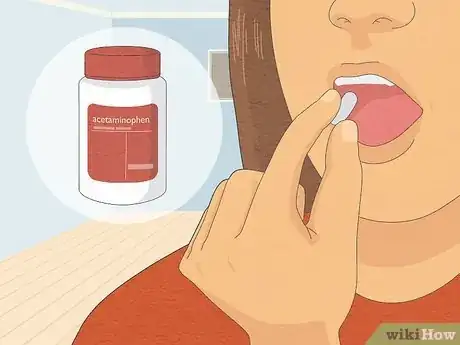
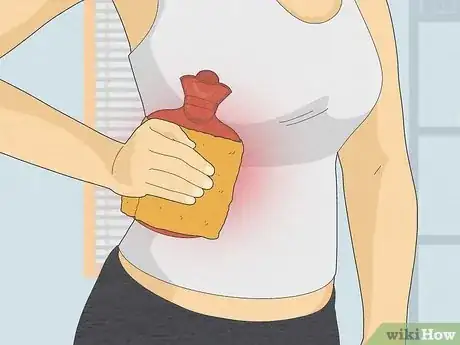
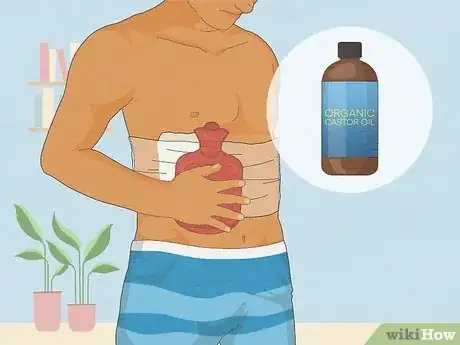
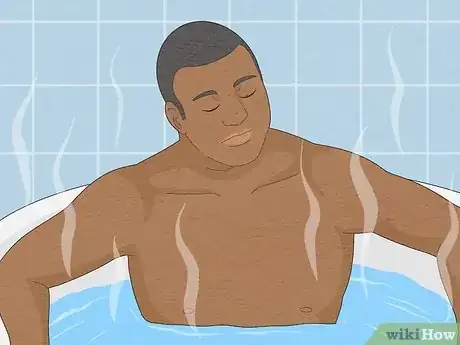

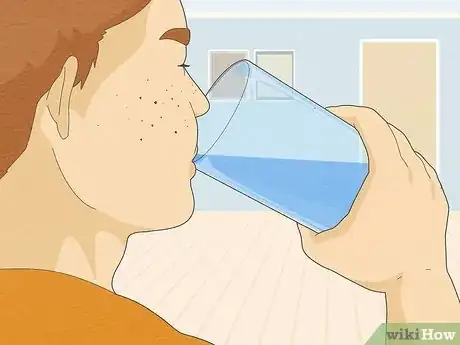
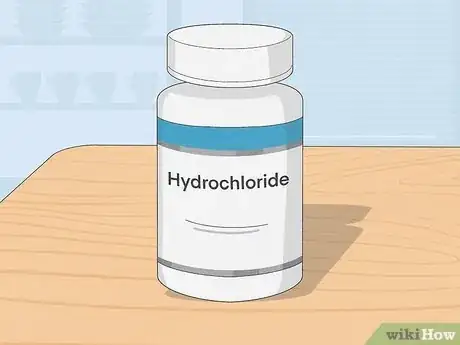
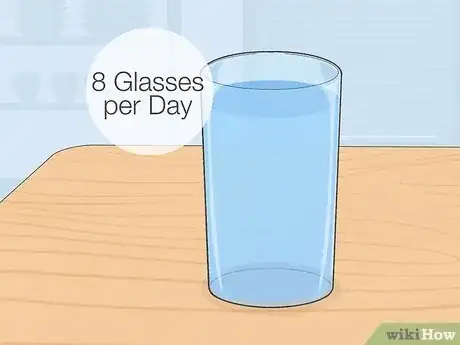
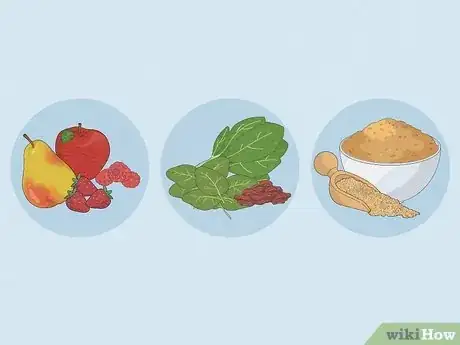
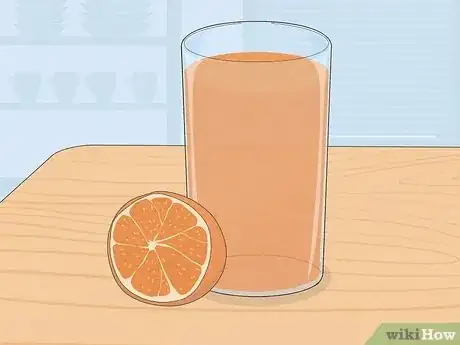
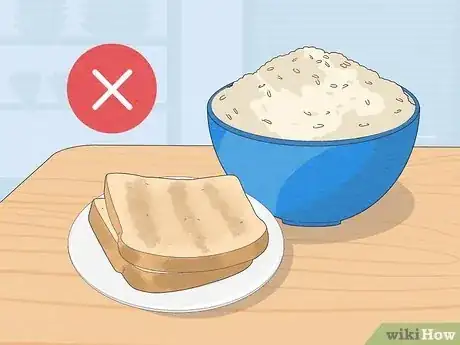
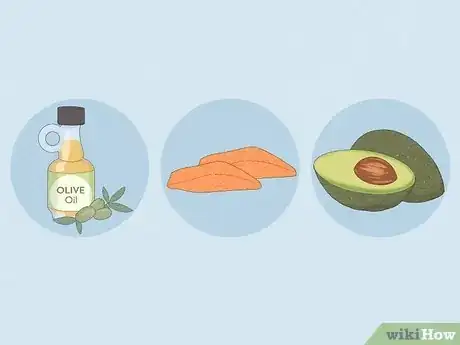

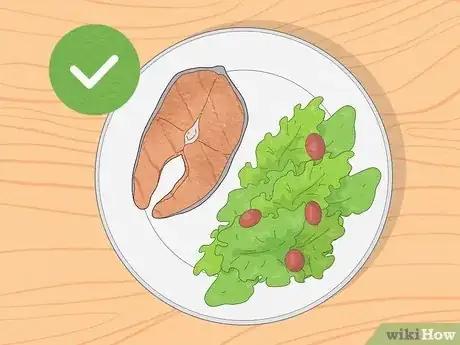
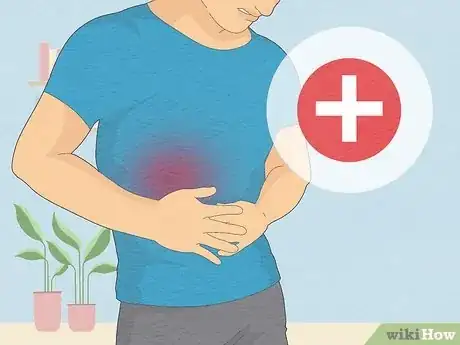
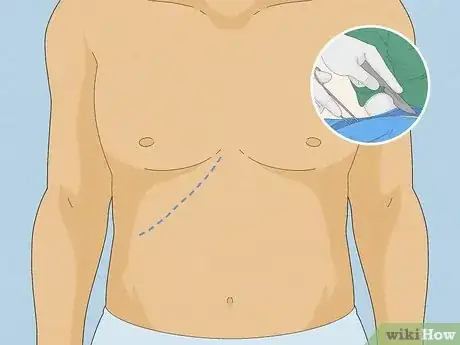
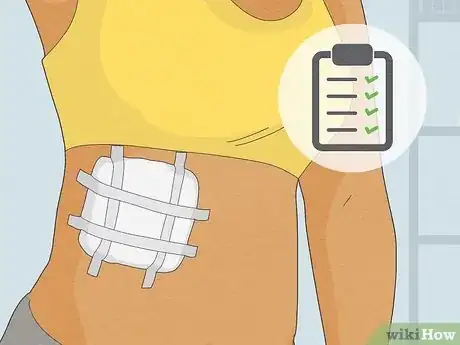
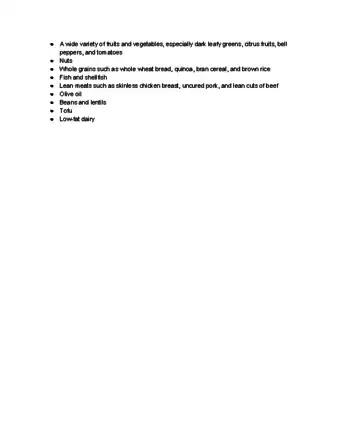
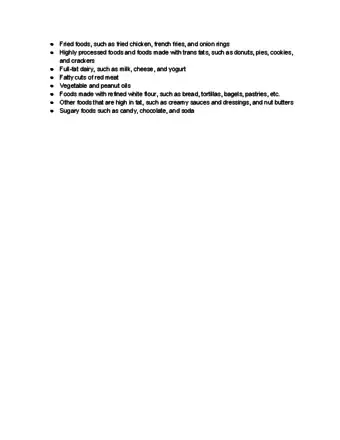
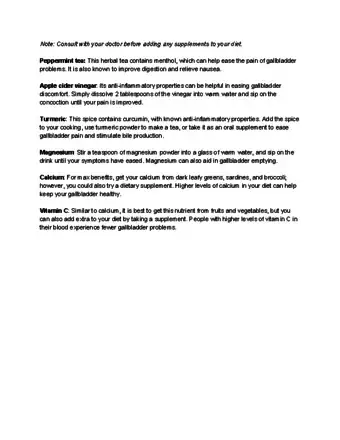
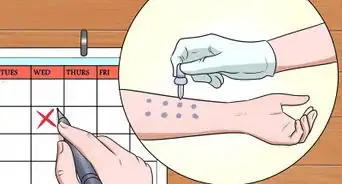
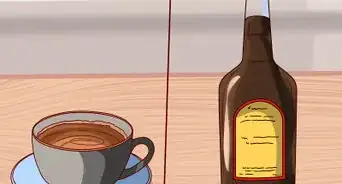
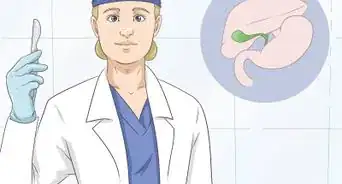
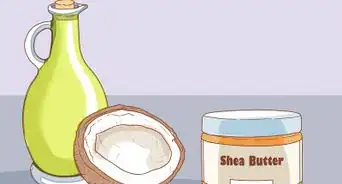
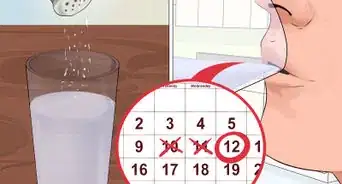
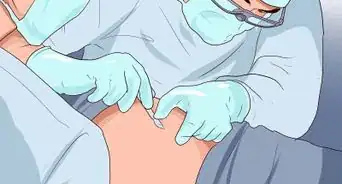
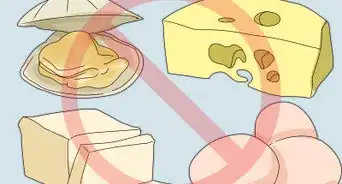
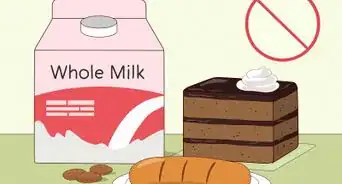









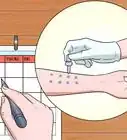

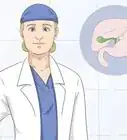
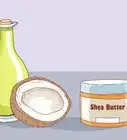




































Medical Disclaimer
The content of this article is not intended to be a substitute for professional medical advice, examination, diagnosis, or treatment. You should always contact your doctor or other qualified healthcare professional before starting, changing, or stopping any kind of health treatment.
Read More...